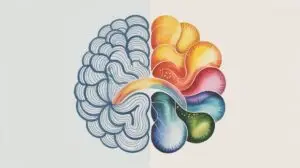If you or someone you love has been diagnosed with Borderline Personality Disorder (BPD), I want to assure you that there is hope for a better tomorrow. While there isn’t a definitive cure for BPD, the good news is that it is highly treatable. In this blog post, we’ll explore treatment approaches, remission rates, and the concept of recovery. Let’s dive in and discover how you can achieve a better quality of life despite living with BPD.
Treatment Approaches: Psychotherapy and Medications
One of the key aspects of managing BPD is finding the right treatment approach that works for you. Let’s explore two main pillars of treatment: psychotherapy and medications.
Psychotherapy
Psychotherapy, also known as talk therapy, is crucial in BPD treatment. It provides a safe space to explore emotions, thoughts, and behaviours. Various approaches have been found effective in treating BPD:
- Cognitive-behavioural therapy (CBT): This structured approach helps individuals identify and change negative thinking patterns and behaviours. For example, a therapist may work with you to challenge distorted thoughts contributing to emotional instability.
- Dialectical behaviour therapy (DBT): DBT focuses on developing skills for emotion regulation, distress tolerance, mindfulness, and interpersonal effectiveness. It equips individuals with practical tools to manage intense emotions and improve relationships.
- Mentalization-based therapy (MBT): MBT focuses on improving an individual’s ability to understand their own thoughts and feelings and those of others. It helps individuals develop insight into their emotions and motivations.
- Schema-focused therapy (SFT): SFT targets deeply ingrained patterns of thinking and behaviour developed in response to past experiences. By identifying and changing these patterns, individuals can develop healthier ways of relating to themselves and others.
- Transference-focused therapy (TFT): TFT helps individuals understand how past experiences and relationships influence their present interactions. By addressing unresolved issues from the past, individuals can develop healthier relationship patterns.
- Systems training for emotional predictability and problem-solving (STEPPS): STEPPS is an educational program that helps individuals with BPD learn emotional management and problem-solving skills.
Remember, finding the right therapist and approach is essential. Finding the best fit for you may take some time, but don’t get discouraged. The therapeutic relationship is key to success.
Medications
In addition to psychotherapy, medications can be useful in managing certain symptoms associated with BPD. Here are some commonly prescribed medications:
- Antidepressants: Selective serotonin reuptake inhibitors (SSRIs) such as fluoxetine (Prozac) or sertraline (Zoloft) may help manage mood swings and depression.
- Mood stabilizers: Medications like lamotrigine (Lamictal) or valproate (Depakote) can assist in regulating mood and reducing impulsivity.
- Antipsychotics: In some cases, antipsychotic medications like olanzapine (Zyprexa) or quetiapine (Seroquel) may be prescribed to manage severe mood swings or psychotic symptoms.
Remember that medication decisions should always be made in consultation with a healthcare professional who can assess your needs and monitor their effectiveness.
Remission Rates: Encouraging Statistics
Although BPD can feel overwhelming, it’s important to know that many individuals achieve remission over time. Research has shown encouraging remission rates:
- A long-term study found that after 16 years, 99% of participants had achieved a two-year remission, while 78% experienced an eight-year remission.
- Symptom relapses tend to decrease over time, indicating that the management of BPD becomes more effective with ongoing treatment.
These statistics highlight the potential for improvement and the possibility of finding stability and relief from the intense symptoms associated with BPD.
Recovery: Embracing a Fulfilling Life
Recovery from BPD is not just about symptom management—it’s about reclaiming your life and creating a fulfilling future. Here are some key aspects of recovery:
Developing Coping Strategies
Learning effective coping strategies is essential for managing BPD symptoms. These strategies may include:
- Mindfulness practices: Mindfulness exercises can help you stay grounded in the present moment and reduce emotional reactivity.
- Self-care routines: Prioritizing self-care activities such as exercise, healthy eating, adequate sleep, and hobbies can contribute to overall well-being.
- Emotional regulation techniques: Identifying triggers and implementing strategies like deep breathing exercises or engaging in soothing activities can help regulate intense emotions.
- Building a support network: Surrounding yourself with supportive individuals who understand your journey can provide validation and encouragement during challenging times.
- Journaling: Writing down your thoughts and feelings can help with self-reflection and gaining insight into your experiences.
Nurturing Healthy Relationships
Developing healthy relationships is a vital part of recovery. It involves:
- Building effective communication skills: Learning to express your needs, set boundaries, and actively listen to others can improve interactions.
- Seeking supportive relationships: Surrounding yourself with people who uplift you, understand your struggles, and support your growth is crucial.
- Engaging in couples or family therapy: Involving loved ones in therapy sessions can help improve understanding and communication, and foster healing within these relationships.
Pursuing Personal Growth
Recovery goes hand in hand with personal growth. Consider:
- Exploring your passions: Engaging in activities that bring you joy and provide a sense of purpose can enhance your overall well-being.
- Setting achievable goals: Breaking larger goals into smaller steps can help create a sense of accomplishment.
- Seeking further education or vocational training: Enhancing your skills and knowledge can open doors to new opportunities and boost self-confidence.
- Embracing self-compassion: Practicing self-acceptance, forgiveness, and treating yourself with kindness is essential on the path to recovery.
In the face of Borderline Personality Disorder (BPD), remember that there is hope for a brighter future. Adopting remission becomes a realistic goal through appropriate treatment approaches like psychotherapy and sometimes medication. Recovery goes beyond managing symptoms; it involves nurturing healthy relationships, developing coping strategies, and pursuing personal growth. Embrace the journey ahead, knowing that you have the power to create a fulfilling life beyond BPD. You deserve happiness, stability, and an enriching future. Keep moving forward—one step at a time!








